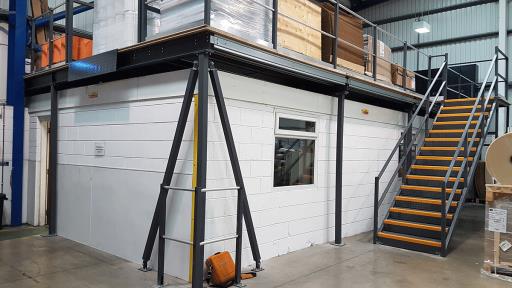Mezzanine flooring is considered the most cost-effective way to expand the working space in warehouses and factories. Many business owners also prefer them because they can easily get them installed. Factory Mezzanine floors always create custom mezzanine solutions that work best with your working area. They are usually constructed with the following materials:
Stainless steel
This is the most popular material used in making mezzanine floors. Steel is preferred by many because it is strong and durable, making it a long-term investment for any warehouse or factory. Its strength allows it to support heavy loads, making it ideal for manufacturing facilities where heavy machinery is used. Furthermore, steel can be recycled, which makes this material an eco-friendly choice. Stainless steel is also resistant to corrosion and is quite strong, making it ideal for construction. The only downside of stainless steel mezzanine floors is that they are quite expensive but well worth it if you consider the benefits they offer.
Timber
Timber is another popular material that can be used in constructing mezzanine floors. It has less strength than steel but still performs well enough to support lighter loads. It is also cheaper than steel but may not last for as long due to its susceptibility to decay when exposed to moisture.
Glass
Glass is another option that many people will choose when they want their mezzanine floors to have an open feel. This material can be installed in several ways depending on how much light you want coming through.
Concrete slabs
Concrete slabs are strong, making them an ideal choice for areas with heavy traffic, such as warehouses and factories. Concrete will not be damaged from the movement of forklifts, trolleys and other equipment, ensuring a long-lasting and durable mezzanine floor.
Metal decking
This is made from galvanized steel sheeting and is the most commonly used flooring in industrial buildings and warehouses. It is lightweight and easy to transport, plus it can easily be cut on-site to accommodate any columns or other obstructions.
Aluminum
This is used as a mezzanine flooring material in many applications. The reason is that it is sturdy, lightweight and resistant to corrosion. Aluminum mezzanine floors are also very easy to clean and maintain. They are ideal for use in food processing plants, warehouses, and similar environments.
Aluminum frames with concrete infill
Aluminum frames with concrete infill are among the best materials to use in constructing mezzanine floors. This type of structure has minimal visual impact. It is ideal for businesses that need to maintain an attractive appearance or keep their business premises open while work occurs.
Carbon steel
Carbon steel has a high strength-to-weight ratio and will not rust easily. It is resistant to extreme temperatures and hard knocks; this makes it ideal for use in warehouses where there are heavy loads, forklifts, temperature changes, etc. It’s a strong and durable metal, but it isn’t very resistant to corrosion, so you’ll need to ensure that the project is completed with a protective coating.
Steel or aluminum frames with timber infill.
This is the most common and cost-effective design for mezzanine floors. It works for a wide range of applications and is flexible enough to incorporate a variety of uses, from general storage to office space. In addition, you can add glass panels to the mezzanine structure if you require extra light but want to maintain privacy between the levels.
Autobiography
Jim Pulman has extensive knowledge and experience in Home Building, Construction, and Design. He writes articles in his free time and partners with content creators to share his expertise with the online community

